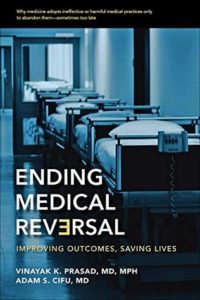
Medical reversals include medications, procedures, devices, surgeries and more.
We expect our doctor to prescribe the most effective treatment for whatever ails us. With increased access to evidence-based medicine in the 21st century, how could physicians fail to find the best therapy for our condition, illness, or injury? But they sometimes don’t get it right. Or, maybe they once did? Medical reversal may be at least partly to blame.

ClinicalTrials.gov lists 408,952 studies with locations in all 50 States and in 220 countries.
Medical reversal occurs when a new clinical trial contradicts current clinical practice. Researchers conducted a comprehensive analysis of 3,000 randomized controlled trials published in the top three peer-reviewed medical journals (JAMA, NEJM, and The Lancet). The analysis identified 396 of those studies as medical reversals. The majority occurred in the fields of cardiovascular disease, preventive medicine, and critical care.
Psychology Today highlights the top 10 medical reversals discovered in this analysis. Conclusive results indicate the following is true, contrary to previous studies:
- Routine mammograms in women under age 50 are not supported
- Nicotine patches are an ineffective tool for quitting smoking
- Physical therapy for a meniscus tear is more effective in treating pain than routine surgery

“Ending Medical Reversal: Improving Outcomes, Saving Lives”
Credit: GoodReads
Perhaps no one understands this healthcare conundrum better than Dr. Adam Cifu, a seasoned researcher on evidence-based medicine, and co-author of “Ending Medical Reversal: Improving Outcomes, Saving Lives.” Cifu reflected on this issue during a recent interview with “Liberty Fund”:
“We realized that some things we’d recommended a couple of years before, we not only no longer recommend but we were sort of apologizing to our patients that we’d recommended it in the first place. And so we sought to figure out.”
The book details further examples of debunked medical research. The authors uncover why medical reversals occur, how they are harmful, and what can be done to avoid them.
Evidence-based medicine is a key element for successful treatment outcomes. Many experts believe that a healthy dose of skepticism to re-examine old ideas is a necessary tool. Some hope new evidence may also weed out myths that remain in modern medicine.

 Medical Reversal Is A Common Anomaly in Healthcare
Medical Reversal Is A Common Anomaly in Healthcare


 Octogenarian Author Jane Seskin Offers a Model for Aging and Living Well
Octogenarian Author Jane Seskin Offers a Model for Aging and Living Well

 Are “Rage Rooms” a Healthy Outlet for Grief and Burnout?
Are “Rage Rooms” a Healthy Outlet for Grief and Burnout?














